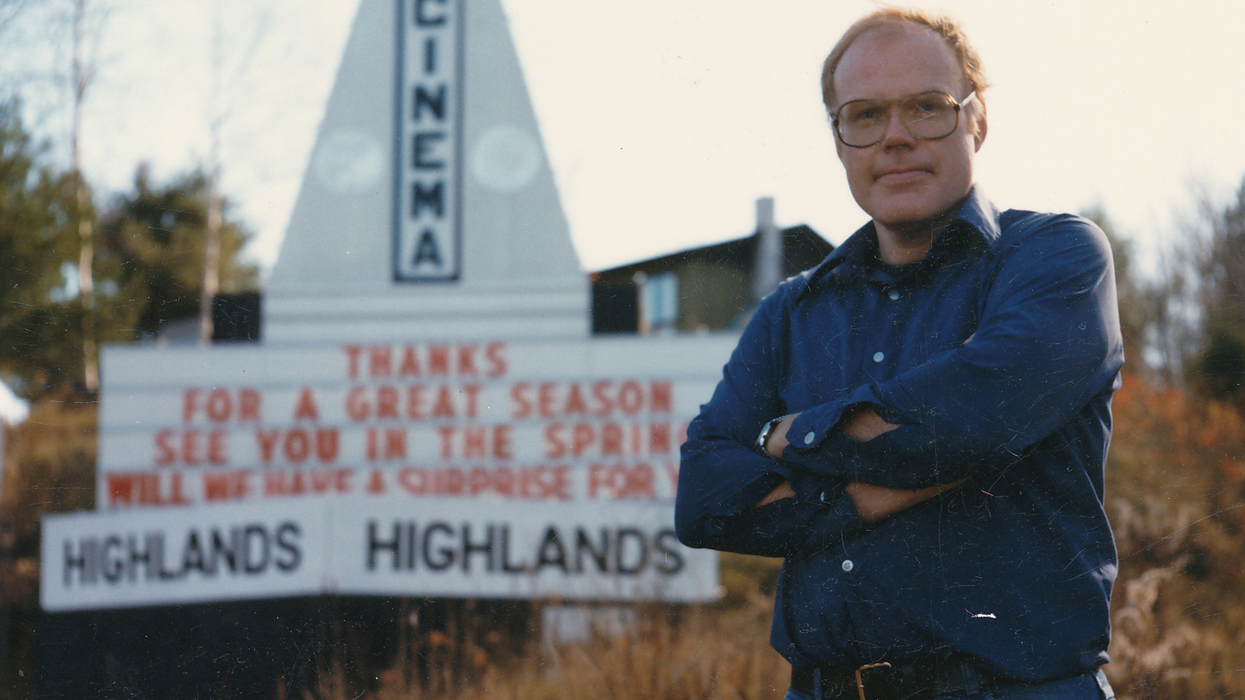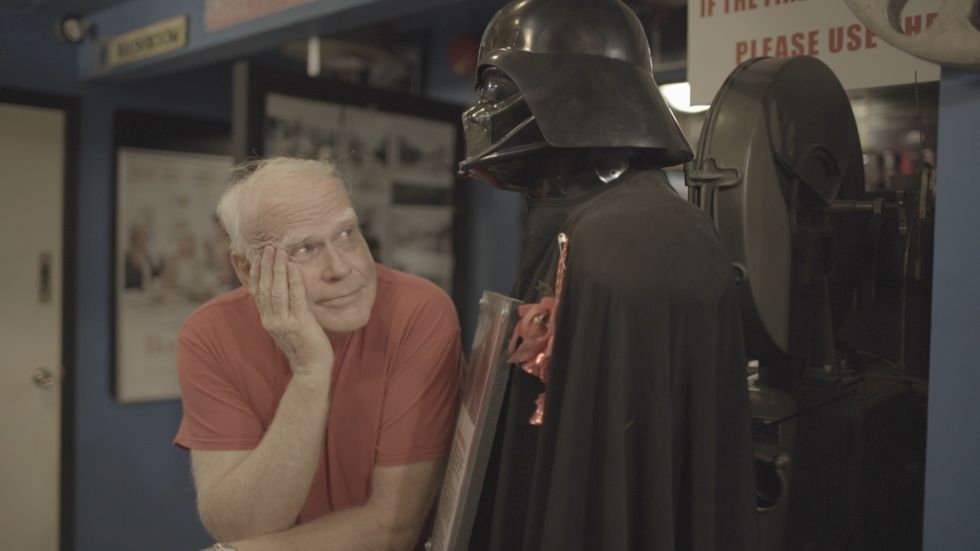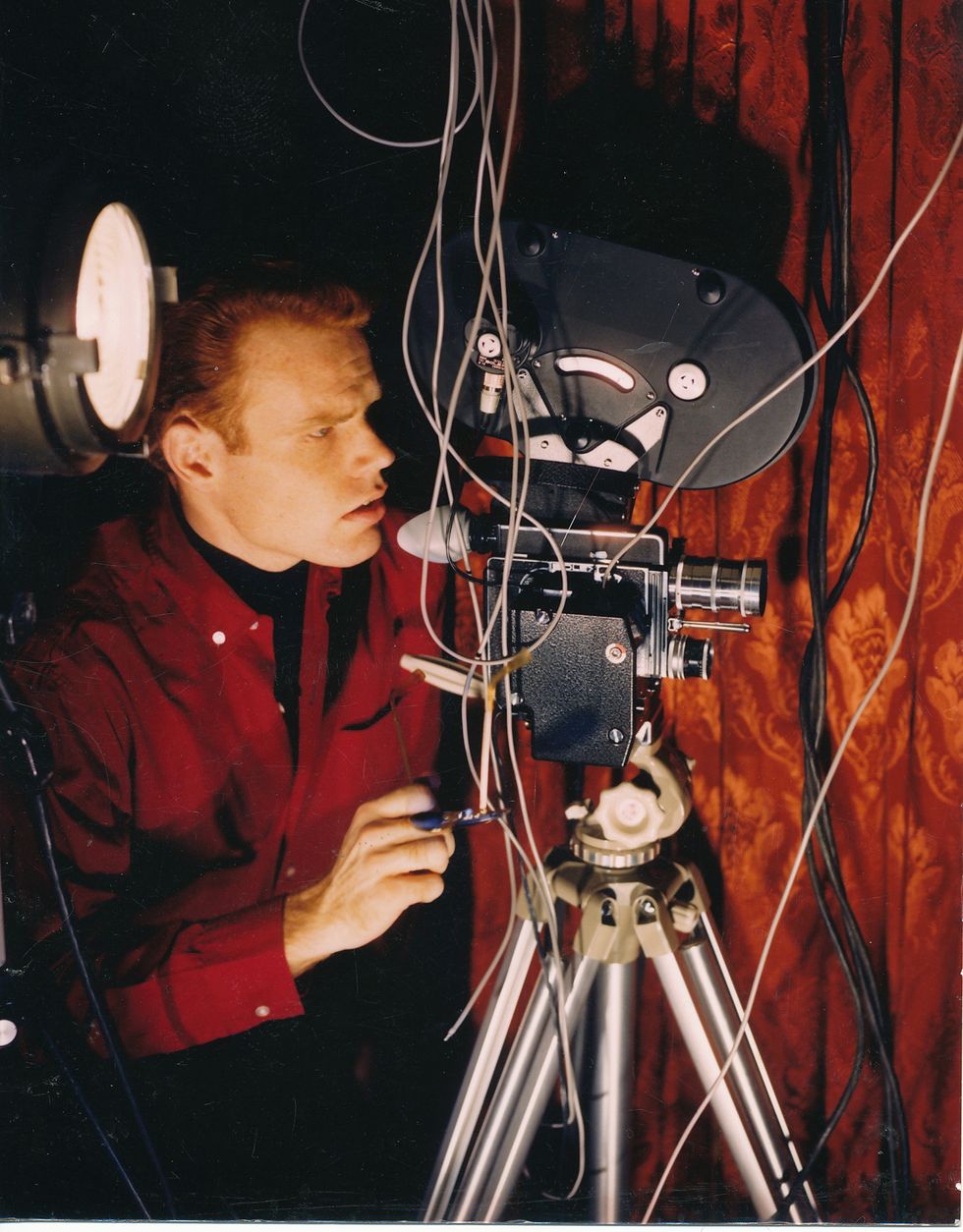How 'The Movie Man' Captures the Importance and Love of Cinema
Documentarian Matt Finlin breaks down how he eternalized possibly the most unique cinema complex in the world with The Movie Man.

Keith Stata outside the marquee of Highlands Cinemas
Forty-six years ago in 1979 an isolated cinephile in the forest of Northern Ontario set out with a dream. That dream, you ask? To build a five-screen multiplex celebrating the importance and love of cinema. Said cinephile, Keith Stata, built this theater from the ground up with the help of his 50 cats. Highlands Cinemas still proudly stands today.
Matt Finlin stumbled across Stata's Highlands Cinemas in Kinmount as an 11-year-old kid camping with his parents and fell in love instantly. Now, as a fellow cinephile and avid theater-goer, he's eternalized his beloved theater in an art of scrappy, low-budget filmmaking in his festival trotting The Movie Man. It's a wonderful work of pure humanist love that equally celebrates indie filmmaking and watching movies where they're meant to be seen.
Considering the challenging state of movie theaters and growing threat of AI, The Movie Man is a delightful beacon of hope and celebration of movies.
Below, Matt was kind enough to share a little extra history on Highlands Cinema, as well as the classic No Film School breakdown of his process crafting this verite documentary against all odds (money and COVID, to name a couple).
Enjoy! And go se movies! Drive to Kinmount and see movies at Highlands Cinema! Watch them everywhere!!
The following interview is edited for length and clarity.
How 'The Movie Man' Came to Be
"I went to for the first time when I was 11, and it was weird. I was camping and it was with my parents and my aunt and uncle, my aunt and uncle had been up there already for where we were basically about two and a half hours north of Toronto. And they said, we're going to go to the movies tonight. And it's in a guy's house in the woods.
As an 11-year-old, you're kind of like, what is this place? And so you drive up this long dirt road and then you can kind of see a building and there's a doorway, but it's covered in trees and stuff, so you can't really get a sense of the building at all. And then until you walk inside and it's an 18,000 square foot movie palace and with five cinemas and movie memorabilia that puts the Academy's museum to shame.
He sort of blocked it out by decades too, as he has cases [of memorabilia]. As a kid it was spectacular, and I was 11 years old and I went to see Terminator 2 and it was really cool. You're just taken by the place, and it made me kind of want to do what I do today.
That was part of the inspiration. It was magic. The whole experience of it was magic. Cut to 20 years later I'd gone over the years to the theater and I thought over a weekend ... I saw from reading here that No Film School article, the Blackmagic URSA Mini Pro, and I was like, this camera is pretty affordable and it looks great. I see friends that have used it and I just liked the color space. [So] I rented it with the idea of going to the [Highlands Cinema] and maybe shoot something over a day or two, just like a little creative piece.
But then I met Keith, and I realized that there's a larger story here. I thought, oh, he's perfect. He's a character.
And you kind of quickly realized that the cinema is Keith and Keith is the cinema. He has no family, it's him and 45 cats, five theaters. And so I just asked him, 'Would you mind if I come and go as I come up? We have a lake house nearby there my family got a couple years prior to that and I'll just pop in and out when I can and film."
Using Verite Filmmaking to Craft 'The Movie Man'

Keith Stata giving Mr. Vader an affectionate glance
Matt Finlin
"I didn't have any money, so it was like I will do is myself on an easy rig. The URSA Mini Pro—this rental house in Toronto was kind enough to give me breaks on rental. I used Cannon CNE primes, mostly a 35mm for the whole film, and I threw a lav on Keith, and I had a shotgun mic. It is a very fly-on-the-wall approach.
It took a lot of patience and a lot of time. I wanted, I love documentaries that you feel like you're in the world and you're not being talked to the whole time [with] talking heads. But I love the verite approach, but it takes so much work and patience.I'm lucky Keith is very stream of consciousness most of the time, so if I missed something, I knew he'd say it again.
Sometimes it was hard getting him to not talk as you get surmised from watching the film. And it took five years and part of that five year journey, it was a two year pandemic. And so it was like when that happened, it was a bit of a challenge to figure out how do we cover this? He was older and I didn't want to get him sick, and you know how it was at the time.
So we figured out to do phone calls with him and I'd go up and shoot B-roll outside of him changing the sign once in a while, kept saying that they're closed. But it gave real stakes to the film. This theater—like so many small businesses at the time—were they going to survive? And then will physically survive? He got quite sick and broke his foot.
I think doing a documentary on this verite approach is like you want to have some idea—a paradigm of where the story's heading.
But it was more for this, okay, I know I need to capture the horror hall, I want to capture the technology piece where he's explaining the challenges with digital, and when he switched over from film. And then there's the cats and the bear, and I knew there were these—for sort of a lack of a better term—columns of storylines that I could shoot these sort of vignettes.
But then I got to a point it was like, well, where's the story? What am I trying to say? And what does it outside of showcasing this quirky theater? And I think then when the pandemic hit it, that landed for me.
So it's like, okay, now let's focus on is this place going to survive and what does that mean to Keith? What does that mean to the movies at large, with what was going on, and what does that mean for the town? So there's all these kind of neat concentric circles that came together and it worked out."
Landing Broken Social Scene to Score 'The Movie Man'

Overhead view of Highlands Cinemas
Matt Finlin
"I got to know Kevin Drew from Broken Social Scene who I worked with through this charity, and we were talking about the film and I sent it to him with no thought of really asking him to make the music or compose anything, but then he is saying how much he enjoyed the film and how important it was.
He is such a cinephile, and he just said, and I asked him, what do you think of the music? I used stock music from a library that most filmmakers use and they're great and it's affordable on a budget. And he's like, oh, no. Yeah, I thought the cues were great and it sort of works. And then so I kind of got enough guts to say, you know what I'm fishing for.
And he sort of laughed and said, 'All right, well maybe I'll leave it with me and maybe I can do a theme, a little theme or something.' And I was like, oh my God, that would be amazing.
And then he came back with a film—A film full of music, the entire film. So these things you luck out with and working with other artists. He just nailed the feeling of the film. He did it very quickly and it just captured the place so perfectly, and I'm just so lucky to have Kevin be part of it."
Matt Kinlan's Advice to Documentarians

Young Keith Stata projecting
Matt Finlin
"My advice to filmmakers or someone trying to do a documentary is what I learned from this: patience.
And I think as anyone who makes a film knows that how hard it is, and if you wait it out and you believe in what you're doing, and if you're lucky enough to have people help you and go suffer and celebrate together, then it's worth it. And then that opportunity, if you're lucky enough to sit in a theater and watch it with a bunch of people, it's like it's magic.
It's also thanks to people like No Film School, access to, whether it's tutorials or information on how to get this stuff done, it's been so helpful over the last 10 years just to be able to think about doing a project.
We did this for very low budget, we got a lot of luck with some favors on rentals and things like with Kevin and stuff, but you just couldn't do it 10 years ago without No Film School to reference. [I had to figure it out] on my own. Is this camera going to be able to do things I needed to do with the resources I have? What are other people saying? And when you come into technical, I did all the titles and stuff like that, or just looking up tutorials on your website or how to figure out how to do things and after effects or whatever, asking other people. It's just so helpful.
When Keith said, did I get anything out of this? I was like, yeah, that one screening was worth five years of work. You know what I mean?"











